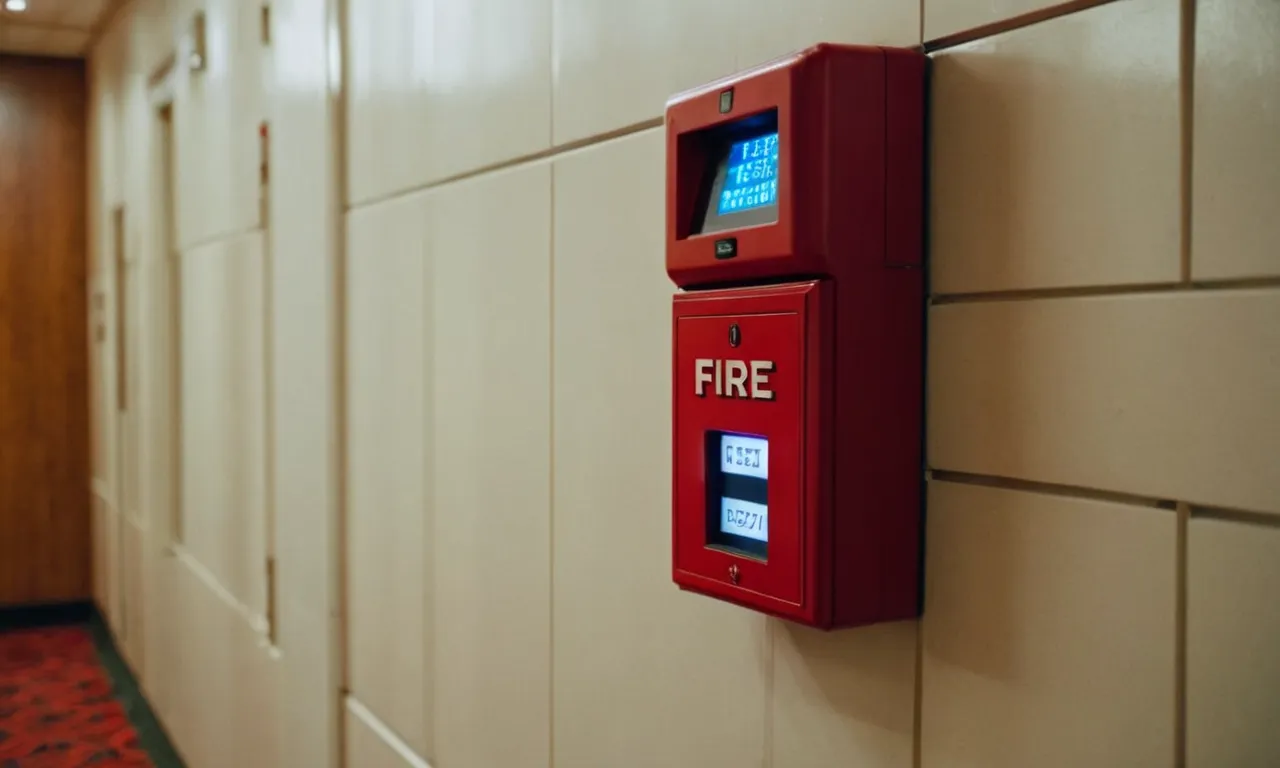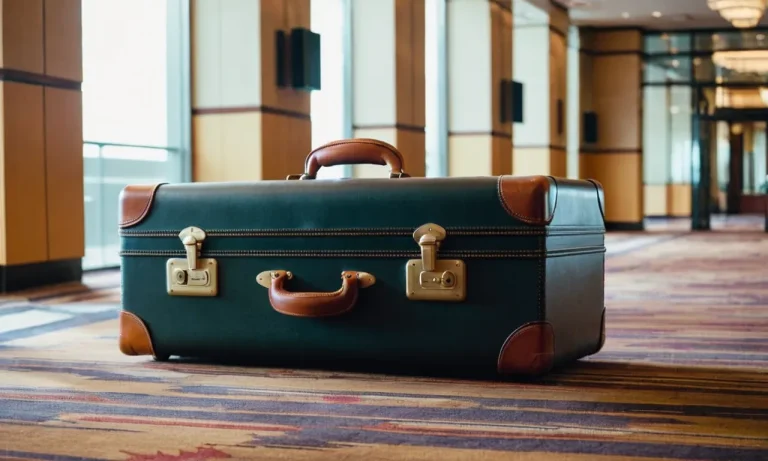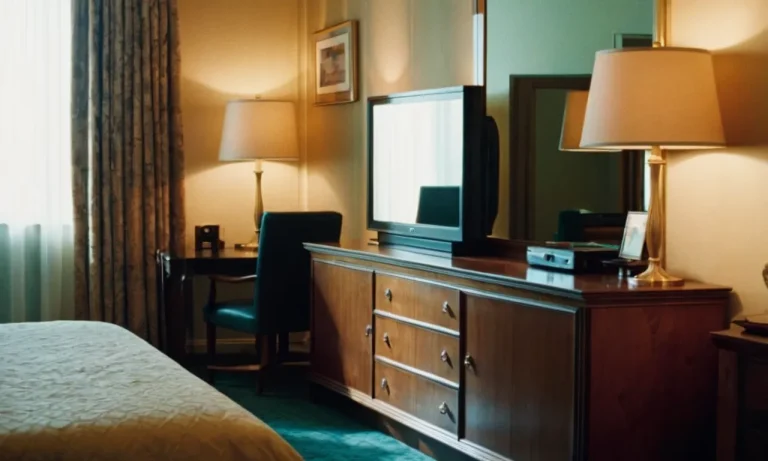Why Do Fire Alarms Go Off In Hotels? A Comprehensive Guide
Have you ever been jolted awake in the middle of the night by a piercing fire alarm in your hotel room? It’s a jarring experience that can leave you disoriented and wondering what’s going on. Fire alarms in hotels are designed to alert guests and staff to potential emergencies, but they can also be triggered by a variety of non-emergency situations.
If you’re short on time, here’s a quick answer to your question: Fire alarms in hotels can go off due to various reasons, including actual fires, smoke from cooking or smoking, dust or steam setting off smoke detectors, faulty wiring or equipment, and even pranks or false alarms.
In this comprehensive article, we’ll explore the most common causes of fire alarms going off in hotels, the safety protocols in place, and what you should do when you hear that dreaded sound. We’ll also provide tips for preventing false alarms and ensuring a safe and peaceful stay.
Actual Fires and Smoke
While false alarms can be a nuisance, the primary reason fire alarms go off in hotels is due to actual fires or smoke. Fire safety is a critical concern for any hospitality establishment, as a single incident can lead to catastrophic consequences.
According to the National Fire Protection Association (NFPA), there are an estimated 3,900 hotel and motel fires reported annually in the United States, causing an average of 15 civilian deaths, 150 civilian injuries, and $76 million in direct property damage.
The Primary Reason for Fire Alarms
Fires in hotels can originate from various sources, including:
- Electrical malfunctions or overloaded circuits
- Cooking equipment or appliances left unattended
- Smoking materials (e.g., cigarettes, cigars) improperly discarded
- Intentional acts of arson
Types of Fires in Hotels
The most common types of fires in hotels are:
- Kitchen fires: Grease fires, oven fires, or cooking accidents account for a significant portion of hotel fires.
- Guest room fires: Fires originating from guest rooms can be caused by smoking materials, electrical issues, or even candles.
- Laundry room fires: Dryer lint buildup and overheated equipment can lead to fires in hotel laundry facilities.
- Electrical fires: Faulty wiring, overloaded circuits, or outdated electrical systems can cause electrical fires.
Smoke from Cooking or Smoking
Even in the absence of an actual fire, smoke from cooking or smoking can trigger fire alarms in hotels. Smoke detectors are designed to be highly sensitive to detect even small amounts of smoke, which can be a sign of a potential fire hazard.
Cooking mishaps, such as burnt food or excessive smoke from grilling or frying, can set off alarms in hotel kitchens or guest rooms. Similarly, smoking in non-designated areas or improperly disposing of cigarette butts can also lead to smoke detection and subsequent alarms.
It’s crucial for hotels to have robust fire safety measures in place, including well-maintained fire alarm systems, proper staff training, and strict adherence to fire codes and regulations. By addressing the root causes of actual fires and smoke, hotels can minimize the risk of incidents and ensure the safety of guests and staff alike.
Regular inspections, fire drills, and proactive maintenance can go a long way in preventing false alarms while also ensuring preparedness for real emergencies.
Faulty Equipment and Wiring
One of the most common causes of fire alarms going off in hotels is faulty equipment or wiring issues. As hotels rely on complex fire safety systems to protect guests and staff, any malfunction or defect can trigger false alarms and cause unnecessary disruptions.
Let’s explore some of the key factors that contribute to this problem:
Malfunctioning Smoke Detectors
Smoke detectors are the frontline defense against fires in hotels, but they can also be a source of false alarms. According to a report by the National Fire Protection Association (NFPA), approximately 23% of smoke alarm activations in hotels are due to malfunctioning detectors.
These devices can be triggered by various factors, such as dust, insects, humidity, or even cooking fumes. Regular maintenance and replacement of smoke detectors are crucial to prevent false alarms and ensure they function correctly in the event of a real fire.
Electrical Issues and Wiring Problems
Hotels are complex buildings with intricate electrical systems, and any wiring issues or electrical faults can lead to fire alarms going off. Aging wiring, loose connections, or short circuits can cause electrical disturbances that trigger the fire alarm system.
According to the Electrical Safety Foundation International (ESFI), electrical fires in hotels and motels account for an estimated $84 million in property damage each year. Regular inspections and maintenance of electrical systems by qualified professionals are essential to mitigate these risks.
Aging or Poorly Maintained Systems
Fire alarm systems, like any other equipment, can deteriorate over time due to age and wear and tear. As hotels age, their fire safety systems may become outdated, leading to increased chances of false alarms or even failure to detect real fires.
According to the NFPA, fire alarm systems should be inspected and tested regularly to ensure they are functioning correctly. Neglecting maintenance or failing to upgrade aging systems can result in costly false alarms and put guests and staff at risk. 😮
To combat these issues, hotels should prioritize regular inspections, maintenance, and upgrades of their fire alarm systems. By working with reputable fire safety professionals and adhering to industry standards, hotels can minimize the occurrence of false alarms and ensure the safety of their guests and staff.
After all, a well-functioning fire alarm system is a small price to pay for the peace of mind it provides. 👍
Environmental Factors and False Alarms
Fire alarms in hotels can go off due to various environmental factors, causing unnecessary panic and disruption. One of the most common culprits is dust and steam triggering the detectors. Even the slightest accumulation of dust particles can set off these highly sensitive devices, leading to false alarms.
Similarly, steam from showers, kettles, or even hairdryers can trigger the alarm system, mistaking it for smoke.
Dust and Steam Triggering Detectors
According to a study by the National Fire Protection Association (NFPA), approximately 23% of all false fire alarms in hotels are caused by dust or steam. These false alarms not only disrupt the hotel’s operations but can also lead to unnecessary evacuations, causing inconvenience to guests and potential revenue loss for the establishment.
To mitigate this issue, hotels should implement regular maintenance and cleaning schedules for their alarm systems, as recommended by organizations like the Underwriters Laboratories (UL).
Pranks and Intentional False Alarms
Unfortunately, some false alarms are triggered intentionally, often as pranks or acts of mischief. According to a survey by the ASIS International, around 12% of false fire alarms in hotels are caused by pranksters or individuals with malicious intent.
Such incidents can have serious consequences, including potential fines and legal repercussions for those responsible. Hotels should implement strict policies and educate guests about the dangers and consequences of intentionally triggering false alarms.
Accidental Activation by Guests or Staff
Accidental activation of fire alarms by guests or staff is another common occurrence in hotels. This can happen due to unfamiliarity with the alarm system, carelessness, or simply human error. For instance, guests may accidentally set off the alarm while cooking in their rooms, or staff members might trigger it while performing routine maintenance tasks.
According to a report by the U.S. Fire Administration, approximately 18% of false fire alarms in hotels are caused by accidental activation. To minimize such incidents, hotels should provide clear instructions and training to both guests and staff on how to operate and respond to fire alarms properly.
While false alarms can be frustrating and disruptive, it’s crucial for hotels to take them seriously and follow proper protocols to ensure the safety of everyone on the premises. By understanding the common causes of false alarms and implementing preventive measures, hotels can reduce the occurrence of these incidents and maintain a safe and enjoyable environment for their guests.
Safety Protocols and What to Do
Hotel Emergency Response Procedures
Reputable hotels prioritize guest safety and have comprehensive emergency protocols in place, including detailed fire alarm response procedures. These protocols typically involve immediate notification to emergency services, designated evacuation routes, and trained staff to guide guests to safety.
According to the National Fire Protection Association (NFPA), hotels must conduct fire drills at least semi-annually to ensure staff readiness. In the event of a fire alarm, guests should remain calm, follow staff instructions, and prioritize their safety above all else.
Guest Responsibilities and Evacuation Plans
While hotels have robust safety measures, guests also play a crucial role in ensuring their well-being during emergencies. Upon check-in, guests should familiarize themselves with the hotel’s evacuation plans, which are often displayed on the back of guest room doors or in the hotel directory.
These plans outline the nearest exits, stairwells, and assembly points. It’s essential for guests to take a few moments to review these plans, as they can be lifesavers in case of a fire or other emergencies. In fact, a study by the U.S.
Fire Administration found that guests who are familiar with evacuation plans are more likely to evacuate promptly and safely.
Preventing False Alarms and Staying Safe
While fire alarms are designed to save lives, false alarms can cause unnecessary panic and disrupt hotel operations. To minimize false alarms, guests should refrain from smoking in non-designated areas, avoid tampering with smoke detectors, and exercise caution when using hair dryers or other appliances that may produce steam or smoke.
Additionally, guests should report any potential fire hazards, such as frayed electrical cords or blocked exits, to hotel staff immediately.
Furthermore, guests can enhance their safety by keeping their room keys and a flashlight within reach, as power outages may occur during emergencies. It’s also wise to dress appropriately when retiring for the night, as evacuating in sleepwear or barefoot could be hazardous.
By following these simple precautions and remaining vigilant, guests can contribute to a safer hotel experience for themselves and others. Remember, fire safety is a shared responsibility, and a little preparedness can go a long way in preventing tragedies.
Conclusion
Fire alarms in hotels serve a crucial purpose – to protect guests and staff from potential emergencies. While the sound can be startling, it’s important to remain calm and follow the hotel’s safety protocols.
By understanding the common causes of fire alarms going off, you can better prepare for and respond to these situations.
Remember, actual fires and smoke are the primary reasons for fire alarms, but faulty equipment, environmental factors, and even pranks can also trigger them. Hotels have emergency response procedures in place to ensure everyone’s safety, and guests should familiarize themselves with evacuation plans and follow instructions from staff.
By working together and taking preventive measures, we can minimize false alarms and create a safer environment for everyone. Stay vigilant, stay informed, and enjoy a peaceful and worry-free stay at your hotel.







